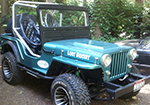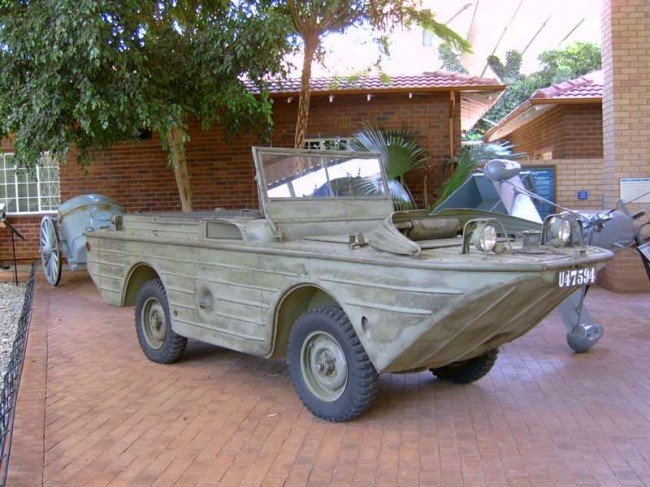Regular readers will remember Claus and his brother from the CJ-2As they restored in South Africa.
Claus also made contact with the Northern Flagship Institution, a national museums institution that falls under the auspices of the Department of Arts and Culture in South Africa. The NFI provided Claus with a detailed response that lists, based on their research, the jeeps that had entered the country.
Curiously, they don’t mention the SEEP (shown below) that is located at the South African Military Museum in Johannesburg. Gavin Walkers Willys MA site has a couple photos of it.
Based on Claus’s suggestion, I did a quick search of the CJ-2A Page Forum and learned here are a few other South African CJ-2A owners as well. So, I thought I’d publish this NFI historical information in hopes it helps others.
Thanks for sending it on Claus!
===============
From the NFI to Claus —
Thank you for your email query of 14 July 2008. The South African National Museum of Military History, a component of the Northern Flagship Institution does not have complete records of Willys Jeep purchases by the Union Defence Forces or by the later SADF. We have found some information which might assist you. Much research is still required to fully answer your query.
Since the Willys Jeep was manufactured in the United Sates of America, all issued American equipment to British Commonwealth countries came via the Lend Lease agreement. The Union Defence Forces had to work through the British War Department to obtain American Equipment via the Lend Lease. The first Jeep, a Willys MB seems to have arrived in South Africa in about October 1943. This Jeep was allocated the Union Defence Forces (UDF) number U 47505 and was used by Capt A A van Niekerk MC, Officer Commanding the paratrooper company of the newly formed SAAF Regiment undergoing training at Premier Mine, Pretoria.
During November 1943, a Willys MB Jeep – U 46-04, was used as a command vehicle during training in the Barberton district, by the Officer Commanding, S A Armoured Brigade, Brigadier C L de W du Toit.
At about the same time (November 1943 – April 1944) some Willys MB Jeeps were allocated to the 6 SA Armoured Division (6 Div) in training at Khatatba in Egypt, the numbers were small but unknown. We believe that 6 Div drew more Jeeps from British stores at Bari at the end April 1944, once they had landed in Italy. The numbers are unknown but this information may be at the SANDF Archives in Pretoria – sandfdoc@mwebco.za.
Photographic evidence shows that the following units used Jeeps in Italy:
During the advance of 6 Div from Cassino to Rome – end May to 6 June 1944:
6 Div Postal Unit
12 Field Squadron, South African Engineer Corps
North of Rome and into Gothic Line:
6 Div Headquarters
11 South African Armoured Brigade Group Headquarters
Prince Alfred’s Guard
First City / Cape Town Highlanders reconnaissance platoon were issued with Jeeps
The Natal Mounted Rifles also had Jeeps by October 1944
During the spring of 1945 and after 6 Div had broken through the Gothic Line the following units are known to have had Jeeps:
7/64 Battery of the Transvaal Horse Artillery
Imperial Light Horse / Kimberley Regiment
The war in Italy ended on 2 May 1945. On 14 May the 6 South African Armoured Division held a Victory Parade at the Monza Racetrack in which all their vehicles were paraded. After the parade the vehicles were handed in to the transport park. Later the vehicles were railed to Genoa to the 6 South African Armoured Division Vehicle Park. A small number of men chose to stay on in Italy after the other servicemen had been sent home to the Union. Many of these men had girlfriends and wanted to stay on and prepare the vehicles for shipping to the Union. The first ship left Genoa for Durban at the end of April 1946. The ex British equipment was shipped first in eleven ships. The American equipment was last to leave Genoa on SS Standridge on 3 May 1947, after much discussion on numbers and payment to the USA.
Only two Willys Jeeps and two 10cwt General Service Jeep Trailers were shipped to South Africa. A third Jeep, purchased by Captain D C Clarke under authority dated 23 September 1946 was shipped on the SS Samarina on 24 September 1946. This Jeep had the British War Department number WD 5662164. These are the only Jeeps to officially come from Italy to the Union.
In 1948, the UDF ordered two hundred and eighty nine Willys Jeeps, the model is unknown. These were allocated the U numbers . U 75800 – U 76088.
Forty three, 1951, Willys 7 seater station wagons were also ordered by the UDF and allocated the U numbers U 76177 – U 76219.
In 1960, twenty-five CJ-3B Jeeps were ordered as well as sixty-one of the more modern CJ-5s. Of the total eighty- eight ordered, only eighty-five were delivered at first, the rest arriving at a later date.
In about 1963/64 the SADF purchased one hundred and nine CJ-6 Jeeps. It is not known if they were manufactured by Willys Motors Incorporated or by the Kaiser Jeep Corporation.
In 1992 there were fourteen CJ-6 Jeeps at 4 Vehicle Reserve Park, Walmanstal, north of Pretoria. These had the following registration numbers.
BCL 953 M BCL 948 M BCL 941 M BCL 952 M BCL 939 M BCL 944 M
BCL 943 M BCL 937 M BCL 938 M BCL 945 M BCL 934 M BCL 950 M
The above listed Jeeps were powered by 4 -cylinder engines.
BDF 775 M and BDF 760 had 6-cylinder engines.
The Museum would appreciate any information you may find regarding Jeeps in South African service.
Yours sincerely
NORTHERN FLAGSHIP INSTITUTION
Incorporating — Transvaal Museum, National Cultural History Museum, SA National Museum of Military History, Kruger Museum, Pioneer Museum, Sammy Marks Museum, Tswaing Crater Museum, Willem Prinsloo Agricultural Museum.


What the heck is that gray thing just to the right of the front of the Seep? A midget aircraft, a military suppository for an enlisted elephant, what???????
Hmm … good question … I don’t know, but someone ought to stop it before it hits the SEEP and explodes.